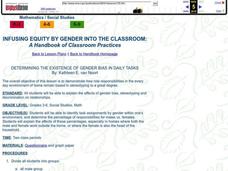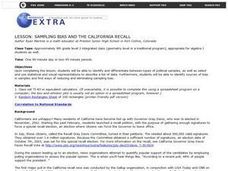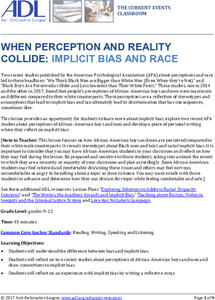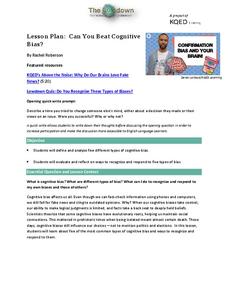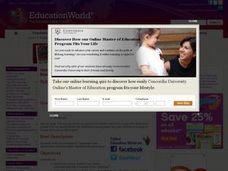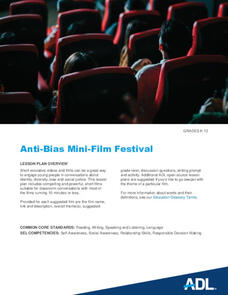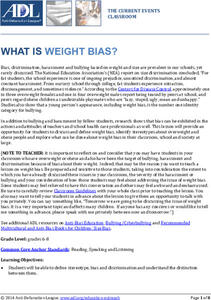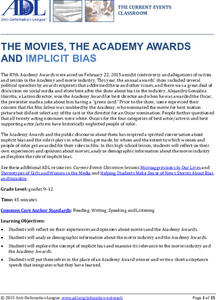Facing History and Ourselves
Confirmation and Other Biases
As the investigation into the reporting of the events in Ferguson, Missouri, continues, class members consider how bias influences perception, how the tendency is to collect evidence that supports preconceived notions. The big idea...
Media Smarts
Bias in News Sources
As young consumers of media, it is important for high schoolers to explore concepts of bias and prejudice, and how they may be present in media. After discussing ideological messages that media can contain, individuals complete a warm-up...
Facing History and Ourselves
How Journalists Minimize Bias
Class members are challenged to write a neutral news story about the events they observe in a short video. After sharing their stories in groups and discussing the different perceptions, the class concludes with a video of journalists...
Curated OER
Determining the Existence of Gender Bias in Daily Tasks
Help your kids explore gender bias. Learners design and conduct a survey examining role responsibilities within families. They determine the percentage of responsibilities for males vs. females and graph the results. Then they analyze...
Facing History and Ourselves
The Challenge of Confirmation Bias
Confirmation bias makes it difficult to overcome our preconceived notions of others. That's the big idea in a lesson plan that teaches learners strategies to recognize and question their biases.
Anti-Defamation League
Implicit Bias
Everyone has biases, both explicit—ones we are aware of—and implicit—ones we are unaware of. High schoolers learn the differences between explicit and implicit bias in a short lesson where pupils watch a short video, read articles about...
Newseum
Bias Through History: Analyzing Historical Sources
Young journalists use the E.S.C.A.P.E. (evidence, source, context, audience, purpose, and execution) strategy to evaluate historical and contemporary examples of bias in the news. The class then uses the provided discussion questions to...
Curated OER
Sampling Bias And the California Recall
Using a 2002 California Gray David recall vote as an example, young statisticians identify sources of bias in samples and find ways of reducing and eliminating sampling bias. They consider ways to select random samples from a...
Curated OER
Bias and Crime in Media
Critical thinking and social justice are central themes for this resource on bias and crime in media. The class views and discusses an incisive PSA that highlights assumptions based on race. Small groups read newspaper opinion pieces...
Newseum
Confronting Conformation Bias
Be curious! Seek out different opinions! Be conscious of your thinking process! After reading an article about confirmation bias and motivated reasoning, class members apply these strategies to the topic of school start times. They read...
Media Smarts
Bias
See how bias operates firsthand. Half of the class reads one article while the other half reads another article on the same event. The obvious differences emerge when the two sides talk about their observations though. Several handouts...
PBS
Who, Me? Biased?: Understanding Implicit Bias
A 10-page interactive explains different facets of implicit bias, demonstrates how implicit bias works, and how people can counteract its effects. The interactive tools permit users to save their information in "My Work" folders, to take...
Regents Prep
Activity to Show Sample Population and Bias
There is bias in many aspects of our lives, and math is no exception! Learners explore provided data to understand the meaning of biased and random samples. The resource includes various data sets from the same population, and...
Southern Poverty Law Center
Analyzing How Words Communicate Bias
Words are powerful ... can your class choose them wisely? Scholars evaluate news articles to discover the concepts of tone, charge, and bias during a media literacy lesson. The resource focuses on recognizing implicit information and...
Curated OER
Modern Interpretations
To conclude an eight-activity study of the events that occurred in the early colonial period in Deerfield, Massachussetss, class members evaluate the point of view and bias found in late 19th and early 20th century retellings.
iCivics
Lesson 3: Bias
How do journalists balance bias and ethical reporting? The final instructional activity in a series of five from iCivics examines the different types of bias and how they affect the news we read. Young reporters take to the Internet to...
Anti-Defamation League
When Perception and Reality Collide: Implicit Bias and Race
The big idea in this activity is that implicit bias often clouds perceptions. High schoolers watch a short video, read research articles, and engage in discussions about implicit bias and how these biases lead to stereotyping. They craft...
NPR
Can You Beat Cognitive Bias?
In a time of fake news, media manipulation, and Internet trolls, a resource equips learners with the tools they need to recognize and combat resources that are designed to appeal to our cognitive biases. Introduce learners to five...
Curated OER
Outgroup Experiment Reveals Bias, Stereotyping
Exploring bias and stereotypes, students dress up as members of "outgroups" (groups of people who are often judged). Though the lesson specifies that it should be "respectful and not mock the outgroup in any way," this activity would be...
Anti-Defamation League
Anti-Bias Mini-Film Festival
Imagine a resource that provides all the materials you need to organize a film festival. Imagination becomes a reality with a five-star resource that has done all the work for you. Eight different award-winning short films are featured...
Anti-Defamation League
What Is Weight Bias?
After setting rules and expectations to create a safe place to share thoughts and feelings, scholars define the terms; stereotype, basis, and discrimination. Using a web brainstorm, learners list words associated with overweight and...
Anti-Defamation League
The Movies, the Academy Awards and Implicit Bias
"And the award goes to. . . " High schoolers investigate bias in the movie industry by reading articles, watching a short video, and examining data about the Academy of Motion Picture Arts and Sciences (AMPAS) membership, nominees, and...
Prestwick House
Understanding Language: Slant, Spin, and Bias in the News
We live in a time of fake news, alternative realities, and media bias. What could be more timely than an activity that asks class members to research how different sources report the same topic in the news?
Curated OER
Fact vs. Opinion: Theory, Hypothesis, and Bias
Emphasize the differences between a theory and a hypothesis to teach your class how to avoid scientific bias.
Other popular searches
- Biased or Unbiased Sample
- Biased Persuasive Text
- Biased Samples
- Biased Survey
- Biased or Unbiased
- Biased Data
- Biased and Unbiased
- Biased Reporting
- Biased Language
- Gender Biased Computer Games
- Biased Question
- Random and Biased Samples





